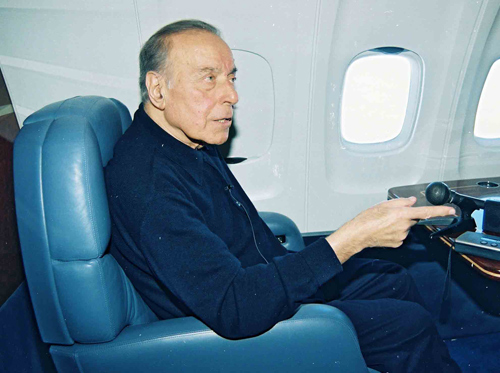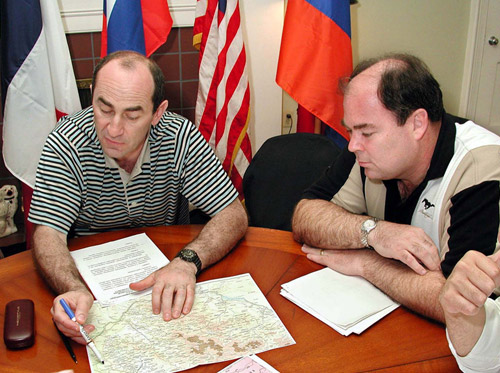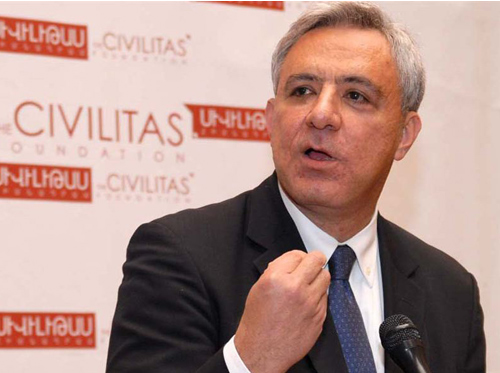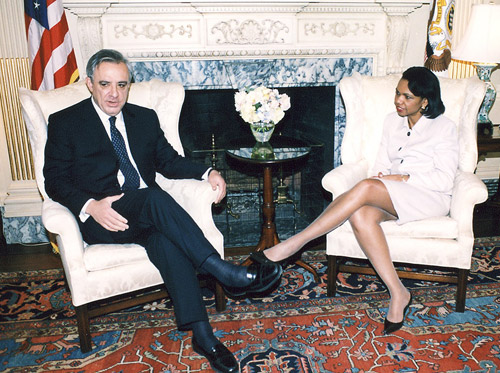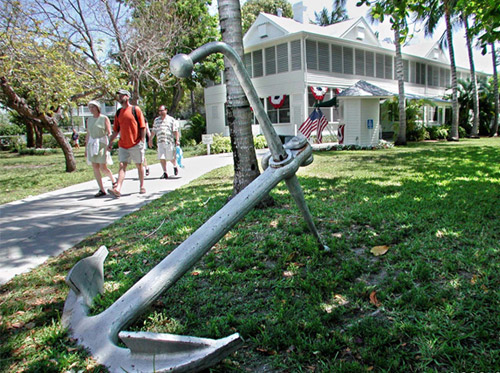2001
January
• Negotiations of Robert Kocharian and Heydar Aliyev were held with the participation of President of France Jacques Chirac on January 26.
February
• Armenian Foreign Minister Vardan Oskanian refutes the statement of his Azeri counterpart Vilayat Guliyev that Presidents of Armenia and Azerbaijan reached oral agreement on the principles of Karabakh conflict settlement.
• Azeri media publishes confidential proposals of OSCE Minsk Group Co-chairs made during various years. Heydar Aliyev said: “If Azerbaijan accepted the model of “common state” we would have lost the sovereignty over Nagorno Karabakh.” A day after the publication of mediators’ proposals in Azerbaijan they appeared in Armenian media.
• U.S. President George W. Bush sent a message to Heydar Aliyev describing the meetings of Armenian and Azeri leaders as an “advance towards a mutually acceptable settlement of Karabakh conflict.” Bush told Aliyev that “the United States was ready to assist to for the creation of public support within your country to back the conflict settlement.”
March
• Second round of Kocharian-Aliyev talks was held in Paris with the participation of Jacques Chirac. Assessing the results of the talks, the French leader said that “positive shift has been marked in the Karabakh conflict settlement.” He expressed the hope that “at definite conditions, the ground for which had already been cultivated, the seeds of the peaceful resolution of the conflict between Armenia and Azerbaijan must grow well by the end of the year. The seeds will then grow into political steps mutually acceptable for Baku and Yerevan.”
• President of Azerbaijan Heydar Aliyev described as “unsuccessful” his latest meeting with Robert Kocharian in Paris, expressing the hope that the United States will positively influence the course of talks.
• Robert Kocharian stated that the resource of his meetings with Aliyev in “one to one” format was almost exhausted. According to him, the parties have already clarified their positions on arguable issues and the OSCE Minsk Group Co-chairs must pick up the “baton”.
April
• On April 3, negotiations of Armenian and Azerbaijani Presidents with the participation of the OSCE Minsk Group Co-chairs began in Key West. U.S. Secretary of State was present at the opening of the talks. In the beginning, harshly criticized Armenia and the mediators. He described Armenia as an “aggressor and organizer of separatism in Nagorno Karabakh.” Heydar Aliyev accused the mediators saying that they had taken a “passive and wait-and-see policy.” Aliyev spoke for over half an hour, shocking the mediators and the journalists. In his two-minute response, Armenian President Robert Kocharian said: “I’ve had such a long trip to Florida not to engage in propaganda campaign here. I’ve come here to carry out constructive work.”
• U.S. Secretary of State Colin Powell said in Key West that “the talks will be very hard.” “President Bush will be watching them closely and I think the President of the United States will express desire to meet Armenian and Azerbaijani leaders in case success is obtained. I can’t say whether it will be this week or some time in the future,” Colin Powell said then.
• Russia, USA and France “work nip and tuck” trying to facilitate Karabakh conflict settlement but the “key to conflict resolution is in the hands of Azerbaijan and Armenia,” the head of the Russian delegation at Karabakh peace talks in Key West, Russian First Deputy Foreign Minister Vyacheslav Trubnikov said. He expressed the hope that the positive atmosphere, which appeared during Key West talks, “might lead to definite positive results.”
• Armenian Foreign Minister Vardan Oskanian said in Key West that “despite some difficulties, on the whole, the settlement process moves forward.” He said that if the Azeri side had the same stance “we would have what to celebrate before leaving Key West.”
• OSCE Minsk Group Co-chairs adopted joint communiqué in Key West voicing their intention to start working over “new comprehensive proposals” for Karabakh conflict settlement. “During 4-day intensive discussions the Presidents exhibited good will and firm commitment to the need of resolving the conflict on the basis of mutual compromises,” the communiqué said.
• Meetings of U.S. President George W. Bush with Presidents of Armenia and Azerbaijan on April 9 were held in an “extremely warm” atmosphere.
• During talks in Florida, possible terms of implementation of conceptions have been discussed. Armenian and Azeri Presidents have discussed them earlier with Jacques Chirac in Paris, senior official in the U.S. administration told a briefing in White House.
• Carey Cavanaugh stated that the next round of Karabakh peace talks with the participation of Presidents of Armenia and Azerbaijan will be held in Geneva in June 2001.
May
• Armenian Foreign Minister Vardan Oskanian said that the peace agreement will envisage return of territories only in case of granting Nagorno Karabakh the status which satisfies the Armenian side. The minister said that Yerevan insists on “horizontal” communication between Nagorno Karabakh and Azerbaijan or on disobedience of Stepanakert to Baku. Oskanian did not rule out that the third unprecedented variant could be found during the talks. The minister pointed out that the corridors, which would link Armenia with Nagorno Karabakh and Azerbaijan with Nakhichevan, cannot be symmetric given various geographic conditions. “As for who is going to control Nakhichevan-Azerbaijan corridor, various proposals can be discussed,” Oskanian went on adding that “the Armenian side will certainly prefer that Armenian forces controlled the corridor passing through the Armenian territory.”
• Commenting on Oskanian’s statements, the Baku “Echo” newspaper wrote citing a source close to negotiation process that the details of the Karabakh conflict settlement plan, voiced by the Armenian minister, run counter to reality. “Nothing has been ever said about such settlement, in Key West either. Oskanian deliberately deludes the public. If negotiations promise almost absolute success to Armenians, why should they undermine the peace process thus violating confidentiality?” Baku newspaper’s source asked?
• On May 5, OSCE Minsk Group U.S. Co-chair Carey Cavanaugh paid an unexpected visit to Baku. Several days later the U.S. official said in the interview to Mediamax that he went to Baku upon Azerbaijani President Heydar Aliyev’s personal request. “President Aliyev’s caught me in Germany. The President asked me to arrive in Baku to discuss some issues,” Carey Cavanaugh said.
• On May 11, Carey Cavanaugh met with Armenian President Robert Kocharian in New York. Addressing a business forum “Investments in Armenia”, Carey Cavanaugh expressed confidence that the leaders of Armenia and Azerbaijan could reach peace agreement which will satisfy both of them. However, Carey Cavanaugh said, the ability of Aliyev and Kocharian to persuade their nations of the need to make compromises will be a peculiar test of their political abilities. “People in Armenia and Azerbaijan realize the necessity of peace. But they can’t fully imagine how to make compromises,” the U.S. official stated.
• On May 19, OSCE Minsk Group Russian, U.S. and French Co-chairs visited the region. During the visit it was announced that the meeting in Geneva due on June 2011, was postponed for an indefinite period of time.
July
• Azerbaijani Foreign Minister Vilayat Guliyev said that ““Paris principles” of Karabakh settlement do not exist.” Guliyev described the statements about “Paris principles” as “regular fiction of the Armenian side.”
• Commenting on Guliyev’s statement, Vardan Oskanian said: “The reality is that after two meetings of Armenian and Azerbaijani Presidents in Paris the mediators found it possible to organize the talks in Key West in order to transfer Kocharian and Aliyev’s agreements to paper. This is what we understand by saying Paris principles or agreements.”
• OSCE Minsk Group Co-chairs visited the region and adopted a communiqué, urging the people of Armenia and Azerbaijan to “understand the necessity of serious compromises in order to provide political settlement.”
August
• The Kocharian-Aliyev meeting was held in Sochi, following which the Armenian leader said: “It would be a mistake to say that we have come to common denominator.
November
• OSCE Minsk Group Co-chairs arrived in the region again. Russian First Deputy Foreign Minister Vyacheslav Trubnikov said in Yerevan that the OSCE Minsk Group Co-chairs offered “nothing radically new” to Armenian and Azeri leaders. We have been working over the scheme that was discussed by Presidents of Armenia and Azerbaijan in Paris and Key West. We had more detailed proposals on separate elements of the settlement scheme, which the two Presidents already know. The new thing is about the details. We still stick to the opinion that we don’t have to invent new schemes,” the Russian official stated.
December
• Foreign Minister of the Nagorno-Karabakh Republic Naira Melkumyan said in the interview to Mediamax that “unfortunately after Key West the Azeri President rejected the agreements reached during previous meetings.” She noted that “the meeting should have been held in Geneva in June, and the sides were waiting for a serious breakthrough and, to some extent, publication of principles the Presidents had been talking about.” When asked about the reasons why the Azeri leadership denied Paris and Key West agreements, Naira Melkumyan said:
• “I think the reason why Aliyev was forced to reject his promises given in Key West was the internal situation in Azerbaijan. Aliyev reiterated his readiness to conduct negotiations the way it was negotiated not only with President Kocharian but also with the Presidents of three big and powerful states- Chirac, Putin and Bush. He hardly knew that he would decline the agreements. I think we can say for sure that he was seriously pressured by his closest milieu, which, given subjective factors, was unable to realize the agreements Aliyev would sign in case the responsibility for their realization lies on it. It’s obvious that President Aliyev, taking into account his desire to pass this post on to his son, had to control his milieu.”
2002
February
• The mediators met separately with the Presidents of Armenia and Azerbaijan in New York and Vienna. Heydar Aliyev said after the meeting that Co-chairs presented some “new proposals”. Armenian Foreign Minister Vardan Oskanian said that at the meeting in Vienna the mediators did not present “any radically new proposals” to the Armenian side. The Russian mediator Nikolay Gribkov said that the Co-chairs were trying to “enrich the agreements reached in the past with new elements.”
March
• On March 8, U.S. Co-chair Rudolph Perrina said at the meeting with President of Azerbaijan in Baku: “time has come to resolve the Karabakh problem.” His Russian counterpart, Russian First Deputy FM Vyacheslav Trubnikov stated that the mediators didn’t have new “revolutionary proposals.” Turning to the Azeri leader Trubnikov asked “not to perceive the Co-chairs’ viewpoint on the path of settlement as pressure.” At the same time, the Russian official stressed that the OSCE Minsk Group Co-chairs wouldn’t like to return from the region empty-handed.”
• Azerbaijani FM Vilayat Guliyev seriously accused the OSCE Minsk Group Co-chairs. He said that “OSCE closed its eyes on Armenia’s aggressive policy.” Guliyev also expressed displeasure with the fact that international organizations, including OSCE, “put forward other ways of conflict resolution” and “call on Armenia to put up with the existing reality and resolve the conflict on the basis of compromises, most of which should be made by Baku.”
• U.S. Ambassador to OSCE Stephan Minikes stated: “The United states of America call on Armenia and Azerbaijan to finish the work initiated at the talks in Paris and Key West last year.” “We urge Presidents Kocharian and Aliyev to do their utmost to reach a comprehensive resolution of the Karabakh problem, based on mutual security and compromises,” the U.S. official said.
August
• On August 11, the meeting of Armenian and Azerbaijani Presidents was held in frontier Sadarak village. After 4-hour negotiations Heydar Aliyev said: “The negotiation potential is not exhausted.”
September
• OSCE Minsk Group Co-chairs arrived in the region. In reply to Mediamax’s question whether we can say that the peace process runs in accord with the agreements reached at the talks in Paris and Key West in 2011, Vyacheslav Trubnikov said: “I think we can’t retreat from these agreements.”
November
• Addressing the session of the Euro-Atlantic Partnership Council in Prague, Robert Kocharian said: “If Azerbaijan accepted the proposed settlement plan, today the peace agreement would have already been partially realized.”
2003
October
• In reply to the question whether the agreements reached at the talks in Paris and Key West were still in force, OSCE Minsk Group Russian Co-chair Yuri Merzlyakov told Mediamax: “We depart from agreements reached at the highest level between the two countries’ leaders. I don’t know anything about other agreements. We still proceed from what the Presidents of Armenia and Azerbaijan stopped at during their latest meeting almost a year ago.
December
• The first meeting of Armenian and Azerbaijani Presidents Robert Kocharian and Ilham Aliyev was held in Geneva.
2004
January
• Russian First Deputy Foreign Minister Vyacheslav Trubnikov said that the meeting of Robert Kocharian and Ilham Aliyev in Geneva “was very important but could not remove all issues including those related to the procedural side.” “Besides, we have to elaborate a new common basis for negotiations,” Vyacheslav Trubnikov stated. “Several settlement variants have been put forward during over a decade’s history of the Minsk Group, and they were all turned down either by Armenia or Azerbaijan. Essentially, all possible settlement variants have already been on the agenda of the negotiation process this way or another,” Russian Deputy FM stated.
• On January 20, Ilham Aliyev said that OSCE Minsk Group Co-chairs should present new proposals for the Karabakh conflict settlement. The Azeri President said that the activity of the OSCE Minsk Group in last several years was “ineffective”, stressing that the Azeri society “awaits much from the mediators.”
• On January 27, Armenian FM Vardan Oskanian said: “Ilham Aliyev realizes his weakness in the Karabakh peace process.” The Minister stressed that the previous Azeri leader was ready to take the responsibility for problem resolution. “Heydar Aliyev thought he had the moral right to settle the conflict,” Oskanian said. According to him, this was the reason why at the talks in Key West in 2011 Presidents of Armenia and Azerbaijan, Robert Kocharian and Heydar Aliyev, come close to the resolution of the problem. Armenian FM said that the reason why the Azeri leader later renounced Key West agreements was Heydar Aliyev’s closest milieu, including his son Ilham. “Heydar Aliyev was already ill and was afraid that he would not have enough time to realize the agreements reached,” Vardan Oskanian said.
February
• OSCE Minsk Group Russian Co-chair Yuri Merzlyakov said that “the negotiation process almost reached deadlock, as neither Armenia nor Azerbaijan want to make concessions.” “Now the situation is so that the sides have frozen on their positions and there is absolutely no movement,” the Russian official said then. According to Merzlyakov, the only alternative is “to arrange some talks between the sides.” “It must not be public, and there must be a possibility to discuss and define issues on which the sides are ready to say something. We don’t have anything of the kind yet. We don’t have even an agenda,” the Russian Co-chair said.
• On February 11, Azeri FM Vilayat Guliyev said that official Baku had the “full right” to start Karabakh peace talks from scratch.
• The reaction of Armenian Foreign Ministry to that statement followed: “If Azerbaijan wants to start the negotiation process from scratch it should turn only to Stepanakert, in cases the latter agrees to, of course.”
March
• Azerbaijani President Ilham Aliyev said that “during 12 years the OSCE Minsk Group failed to take any positive step.” “Today, the position of the OSCE Minsk Group cannot play positive role, since it is expressed not by the resolution of the issue but by the observation over it,” the Azeri leader said.
• Ilham Aliyev refuted the reports about agreements between Yerevan and Baku on the settlement of the Karabakh conflict. “There are and have never been any agreements. It is the regular invention of the Armenian side,” he said. “If there is such an agreement then let the Armenians officially speak about it or publish it in media. I would suggest giving up such lies. The time of such provocations has gone. Peace requires transparency today. No agreement, even a secret one, can be kept secret. I talked to OSCE Minsk Group Co-chairs and called on them to advice these people in Armenia give up falsehood, as it does honor to neither of the sides involved,” Ilham Aliyev said.
• Armenian Foreign Ministry urged official Baku “not to play hide-and-seek,” and “clearly and honestly state” about their reluctance to take into account the results of Karabakh peace talks held in recent years. As for Azerbaijani President’s proposal “to endorse the documents if they do exist”, as the official representative of the Armenian Foreign Ministry said, “the written documents are drafted not by us but by the OSCE Minsk Group, and if the Azeri side is interested in their publication, it should turn to the mediators.”









